
Original price was: €299.99.€134.98Current price is: €134.98.
Korg 16-Key Synthesizer VOLCABEATS, Black Price comparison
Korg 16-Key Synthesizer VOLCABEATS, Black Price History
Korg 16-Key Synthesizer VOLCABEATS, Black Description
Korg 16-Key Synthesizer VOLCABEATS – Black
Unleash your creativity with the Korg 16-Key Synthesizer VOLCABEATS in Black. This versatile and compact synthesizer opens the door to a world of sound-making possibilities, making it perfect for musicians, producers, and hobbyists. Whether you’re looking for a portable solution to create tunes on the go or wish to enhance your existing setup, the VOLCABEATS won’t disappoint. In this detailed product page, we explore its features, pricing, reviews, and more!
Key Features and Benefits of Korg VOLCABEATS
- Unique 16-Key Interface: The Korg VOLCABEATS features 16 velocity-sensitive keys, enabling detailed control over your beats and melodies. Play with dynamics and create grooves that truly resonate.
- Compact and Portable: Measuring only 4.54 x 7.61 x 1.78 inches and weighing merely 13.1 ounces, this synthesizer is lightweight and easily portable. Carry it in your bag and make music anywhere, anytime!
- Battery Operated: Powered by 6 AA batteries (included), you can enjoy hours of music-making without worrying about finding an outlet. Ideal for live performances, jam sessions, or spontaneous composition.
- Flexible Connections: Equipped with a 3.5mm stereo mini jack output, the VOLCABEATS can connect seamlessly to amplifiers and mixing consoles, ensuring excellent sound quality in any setup.
- Exceptional Sound Quality: Designed by Korg, a leader in synthesizer technology, the VOLCABEATS provides rich tones and deep bass, ensuring your music stands out in any genre.
Price Comparison and Trends
When it comes to pricing, the Korg 16-Key Synthesizer VOLCABEATS offers competitive options across various suppliers. You can typically find it priced between $150 and $200 at major retailers. Our price comparison tool allows you to see the best deals available. Over the past six months, the price of the VOLCABEATS has shown a downward trend, making it an opportune time to purchase. With regular price fluctuations, you can secure a better deal if you take advantage of offers that may arise!
Customer Reviews Highlights
Many customers rave about the Korg VOLCABEATS, highlighting its ease of use and intuitive design. Users appreciate the responsive keys and the overall sound quality. Some praised its portability, perfect for traveling artists and DJs. However, a few noted that the synthesizer may not have all the features required for advanced sound design, particularly for those accustomed to more complex setups. Overall, the feedback has been largely positive, indicating the VOLCABEATS is a reliable choice for both beginners and experienced musicians alike.
Explore More with Unboxing and Review Videos
For those wanting a deeper dive into the Korg VOLCABEATS, numerous unboxing and review videos are available on YouTube. These videos demonstrate the synthesizer’s features and sound capabilities, providing valuable insights into how it performs in real-world scenarios. Watching these videos can aid you in making an informed decision and inspire your next creative project.
In summary, the Korg 16-Key Synthesizer VOLCABEATS is a fantastic musical tool capable of shaking up your creativity. With its compact design, versatile features, and stellar sound quality, it’s an excellent addition to any musician’s collection. Don’t miss out on the fantastic prices available across various suppliers — compare prices now!
Whether you are a beginner exploring music creation or a seasoned artist wanting a portable option, the Korg VOLCABEATS is tailored for artists at any level. Experience the joy of creating music with this powerful synthesizer today.
Compare prices now!
Korg 16-Key Synthesizer VOLCABEATS, Black Specification
Specification: Korg 16-Key Synthesizer VOLCABEATS, Black
|
Korg 16-Key Synthesizer VOLCABEATS, Black Reviews (7)
7 reviews for Korg 16-Key Synthesizer VOLCABEATS, Black
Only logged in customers who have purchased this product may leave a review.

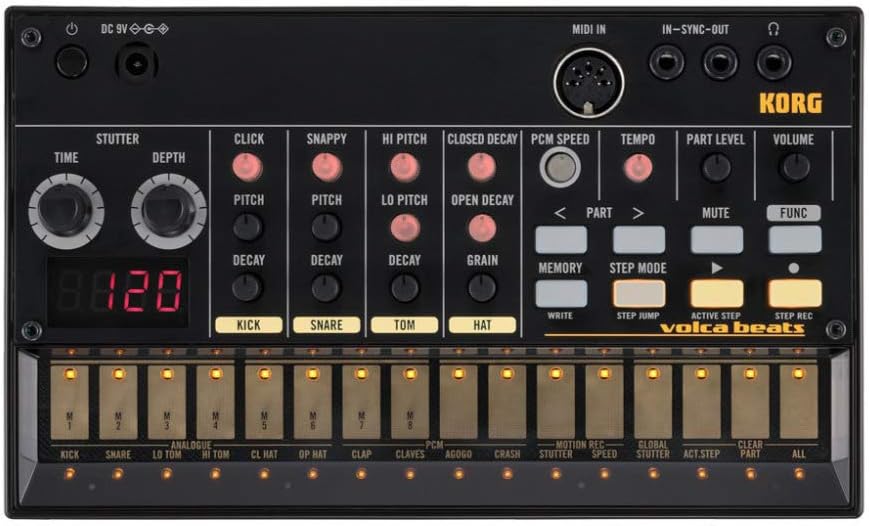
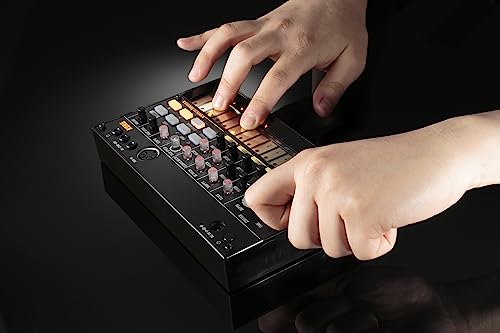
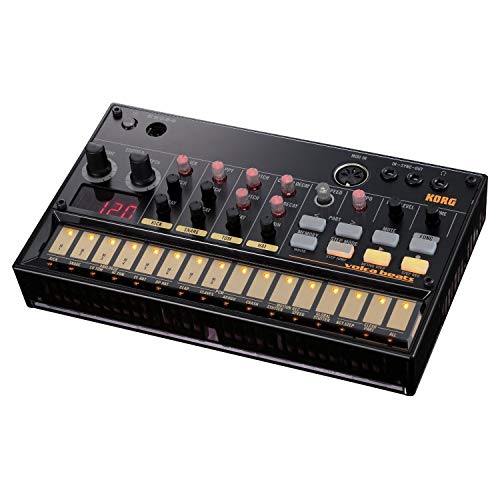
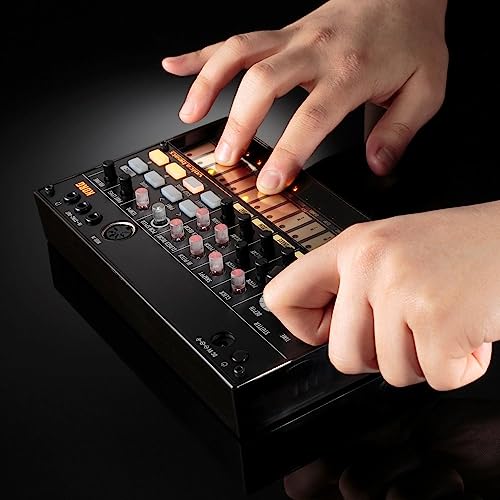
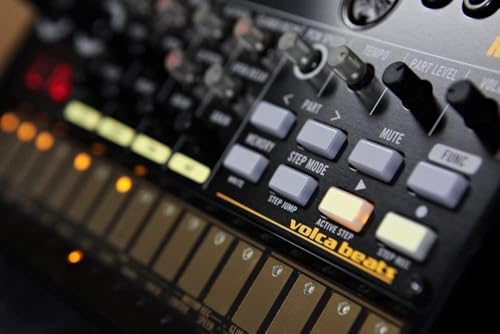






Huerell –
A diferencia de otros drum machines, este a pesar de ser digital, tiene un verdadero motor de sintesis en vez de trabajar samples como otros casos. Muy versátil para todos los géneros y muy intuitivo. A pesar de ser pequeño, funciona bien para en vivo
Retired golfer/bounty hunter –
I’m starting to collect these things like special edition Lego sets. It’s really fun to experiment with sounds. And create your own unique sounds you can capture to another device turn it into an instrument.
Ariel Ramos González –
O Korg Volca Bass supera em muito aquilo que se espera de uma máquina de baixos sintetizados analógicos. Com três osciladores e outros recursos , é possível compor melodias expressivas e fazer sobreposições harmônicas. Excelente! Fica com um som ainda mais bonito se for ligado em uma mesa com reverb e delay para ambientação “espacial”.
O ponto fraco é o auto-falante interno. Muito ruim, mas é melhor do que nada se você estiver fissurado para trabalhar com a máquina e não tiver bons fones de ouvido.
Francisco Antonio Olivas Pérez –
It’s not only a great little instrument but also a great way of learning how electronically made sounds can be used in musical compositions.
Retired golfer/bounty hunter –
The media could not be loaded.
Me gustó mucho, llegó rápido a mi país pero Dhl es muy lento, pero hoy llego y estoy fascinado,lo recomiendo totalmente.
J.R. –
This was an impulse buy on Amazon Warehouse (AW) on a bitterly cold night in early February, an evening when I had had a few too many glasses of wine. I was vaguely aware of the Korg Volca series, in that I had seen a few negative or neutral comments about them on various music forums, but I hadn’t listened to any audio demos or watched any YouTube demonstration videos. Honestly, these tiny boxes had never appealed, as I like my synths with keys or something I can put in a rack and MIDI up to my rig. So when this popped up on AW in a “Used-Acceptable condition for what seemed to be nearly 50% off the retail price, I thought, well, if I don’t like it, I can sell it on for a profit.
I’m glad I did. I love this little box, and it looked absolutely brand new in the box when it arrived. Go figure. I like it more than my Pro-1 monosynth — I think the Volca Bass sounds better than most of my keyboards, with the exception of my Korg Radias. I mean to say, the Volca Bass is fat sounding, and oh!!! it has that distorted squeal that is very similar to a Roland TB-303 (or the Behringer clone). The filter resonance (peak knob) on this wee thing self-oscillates, so if you’re looking to do a bit of Daft Punk or Chemical Brothers-style late 90s and early 00s techno work, this little guy can do it, and do it very nicely.
Let’s get the cons out of the way:
The speaker is rubbish. I get why Korg put it there, but the speaker doesn’t have the range to actually hear what all the glorious goodness this synth can make. Tip: Use headphones if you’re going portable with this. Otherwise, hook it up to your mixer / monitoring system / amp.
The MIDI implementation is good, but you can’t modulate the filter via MIDI. What???!!! Why not, Korg? What are you thinking? Sigh… So, you must use the Volca Bass’s filter knob in real-time. Also, no MIDI out, but it is possible to modify the unit so that it can do MIDI out, so at least there’s that option for the hardcore modders.
Pattern storage is limited to 8 memory slots. You will use those up quickly, and then you’ll have to decide on which patterns to get rid of for later sessions. Also, there is no pattern chaining, so you must manually change patterns in real time, and you will need to do that in perfect sync as there is also no “wait to change pattern” functionality. If you’re sequencing a pattern, know that the filter knob adjustments do not get recorded. The octave knob’s movements will be recorded, however. On the other hand, it is possible to create 24 patterns when in individual three-osc mode, and with a bit of clever muting, you can probably do quite a bit with that.
The smaller, clear knobs … it’s sometimes difficult to see what their positions are. Also, when I reach for the tempo or the EG attack knobs at the top center/left of the unit, I often accidentally brush the big filter knob.
No noise oscillator… that’s a shame. But not a deal breaker…
So them’s me cons. On the the pros:
Three very stable analog VCOs (digitally tuned for stability, but these bad boys are definitely analog oscillators), any of which can be a Saw or Square wave. You have the options of three independent VCOs, two stacked together, or all three stacked together. There is also a tuning knob for each VCO, so you’re able to create a very thick and fat super saw sound. Note range can be adjusted per voice but only if you are sequencing a pattern. Otherwise, all three VCOs will change depending on where the octave knob is set.
The playing surface (ribbon?) is really responsive to touch and it’s fun to play and slide around on it, but it is important to note that the playing surface is not velocity sensitive. The Volca Bass responds to velocity when connected to MIDI controller, though. Keep that in mind if you want to get the most you can out of this tiny box of joy. It took me a few minutes to work out what the deal was with the black and gold “keys.” Tip: The gold keys are the black keys on a keyboard. The rest are the white keys. The lowest note on the surface is an “A”. Maybe an “E” would have been better, which is the lowest note on a bass guitar, but from keyboard perspective I suppose it makes sense (an 88-key keyboard’s first note is an A.)
The filter on this insanely good. I read somewhere that it’s based on a Korg 700s filter. I dunno if it is or not. And I don’t care. I really like a lot.
The envelope seems limited, but it actually has two modes and it is perfectly serviceable. One mode with no sustain segment, just an attack and delay, which is superb for punchy bass tones, and the second mode is with a sustain feature, which is great for more synthy sounds and self-oscillating the filter rez. These modes are switched by holding down the function button and pressing the number 11 key marked Sustain.
Pattern sequencing is quick, if not a bit imprecise when doing it in real time. There is some sort of quantization going on, which can be distressing if your timing is off. I much prefer to sequence a pattern in Step Rec mode. Speaking of modes, the Active Step mode is useful and fun.
At the moment, I tend to use a Beat Step Pro to sequence more complex patterns. Other times, I will set up a zone on my workstation to play the Volca Bass via MIDI in real time. I’ll even swipe at the playing surface from time to time when playing other synths. You’ll definitely want to put some effects in the signal chain, such as pedals or some other multi-fx unit, as the dry sound may be a bit in your face. But even dry, it can sit in a mix at low volumes.
All in all, I’m really impressed by the sound of the Volca Bass. I had no idea that I was missing this in my life, and I’m glad I bought it. I’m now considering selling my Pro-1, as I have had that turned off since the beginning of February when the Volca arrived and I don’t need two monosynths which cover the same sonic terrority.
For its size, it’s a little powerhouse in a tiny, tiny box. Could the UI (knobs), memory storage and MIDI implementation be improved? Sure, those could be better, but if you can snag one of these for $100 or less, it’s definitely worth it.
J.R. –
Korg’s Volca series is great, but it would probably be helpful to know what you’re getting into ahead of time before purchasing. While there’s a lot of videos on YouTube, and some busy topics on Reddit discussing the merits of these machines, I think I fit pretty accurately the target audience for the series to help speak on whether or not they might be right for you: I’m an amateur to synthesis and have minimal space for gear, a low budget, and an affinity for low-fi sounds.
That being said, I started with the Bass about a year and a half ago and admittedly didn’t really understand the thing, or how to use it in my workflow that at the time was primarily just clicking around in the DAW. After jumping over that hurdle and learning the various functions and controls, the thing really opened up. While it’s certainly got a tinny/metallic sound to it and is by no means your classic acid machine, the thing really screams and can make some great sounds. Granted, I don’t have years of experience with higher-end synthesizers to compare against, but that leads into my next point, which is that these machines are just fun, especially for someone starting out working with hardware.
I’ve seen complaints about them being ‘toys’, or limited in what you can do with them, and while I won’t argue the merits of that based on some folks’ perspectives, the small, portable nature of them makes them a non-invasive addition to a small space and perfect for picking up and messing around outside of the desk or studio environment. The price tag encourages buying them over time, and since getting the Bass, I’ve added the Beats, FM, and Keys to the mix. They each have their own quirks and limitations that encourage creativity. As well, they’re powerful enough to be useful, and rather than being overwhelming machines (a bit like the Microbrute is for me as still-an-amature), they’re in most respects easy to learn. The FM’s a bit of it’s own story though, as FM synthesis is complicated by nature.
I’m hesitant to purchase the Sample, simply due to the lack of an audio in. Maybe the iOS app is convenient and easy to use, but it still adds an extra layer to getting sounds on the machine. Which brings me to another point: if you’re considering either the Beats or the Sample, you might look first for a used ES-1 or ER-1. They’re roughly the same price, but a bit more versatile (although bigger), and at least in comparing the ER-1 to the Beats, sound considerably better (the Beats snare issue is annoying, but not a total deal breaker if the other pros outweigh that con).
In summary, I think these are really great, affordable little machines. Without the hassle of buying old buggy hardware, you get some new portable things with a lot of potential. If you’re looking for machines with ‘recordability’, though, these probably fall more in the jam-box or accent-to-other-machines category.
Have fun!